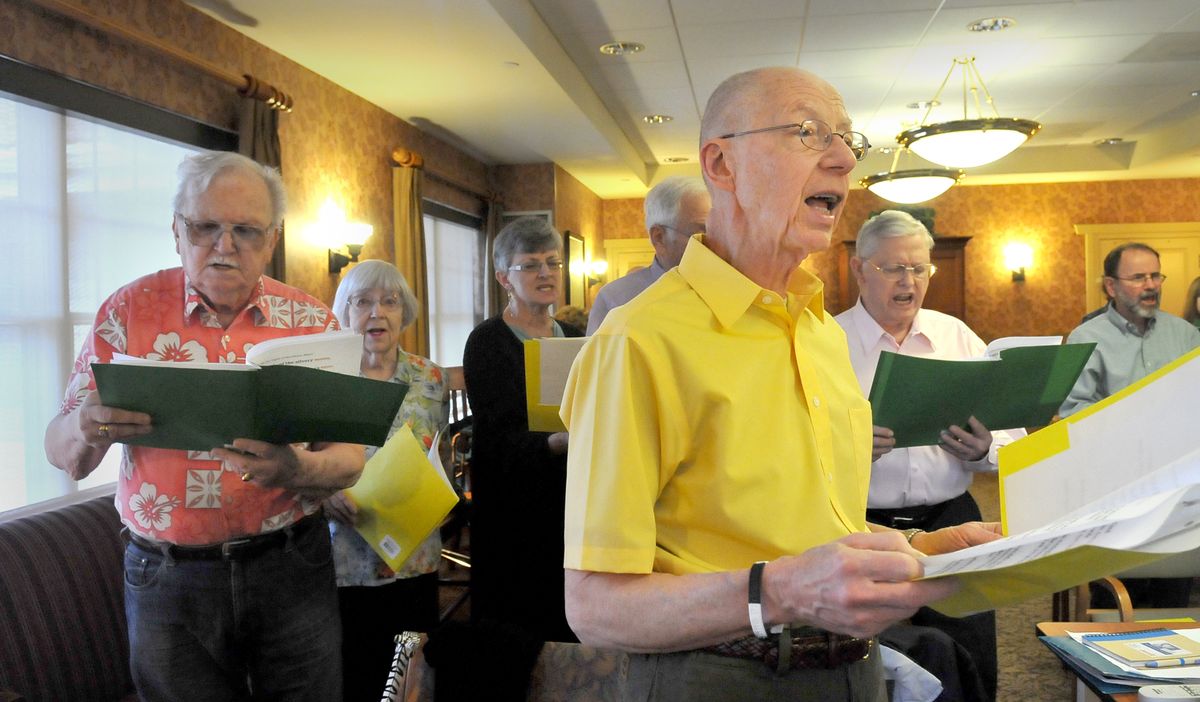Singing helps keep Parkinson’s effects at bay
Tremble Clefs helps members preserve voice, find support

The sprightly, upbeat melody of “Side by Side” echoed down the halls of Rockwood South on March 29, as members of Tremble Clefs serenaded residents and guests.
Tremble Clefs is a singing ensemble composed of people with Parkinson’s disease and their caregivers. The program is one of the services offered by Parkinson’s Resource Center of Spokane. The center also sponsors a dance group and several support groups.
While the most visible sign of Parkinson’s is trembling, some patients experience loss of voice volume and control. So, in addition to dealing with tremors that can make it difficult to walk confidently or button a shirt, many patients struggle just to be heard.
But the singers in Tremble Clefs had no problem making themselves heard as they launched into a robust version of “Don’t Fence Me In.”
Dr. John Moyer grinned as he sang. His wife Joanne Moyer said, “He was diagnosed with Parkinson’s in 1998. It got to where I could hardly understand him – his voice was so low.”
But then he joined Tremble Clefs. “It’s amazing how quickly participating in the group improved his volume and projection!” She smiled at her husband, who remained seated as he sang.
Moyer said, “His balance is increasingly poor, but he loves this!”
Several years ago Spokane speech-language pathologist Sarah Nielsen learned about Tremble Clefs at a conference for health care professionals. Research has shown that singing can dramatically help patients struggling with Parkinson’s-induced “soft voice.” Nielsen said, “I came back eager to start a group, but I have no singing or musical experience.”
However, she soon met Ruth Palnick. “Ruth is a beautiful singer,” said Nielsen. Palnick also has Parkinson’s disease. Together they launched Spokane’s Tremble Clef program in 2005. The group meets each Tuesday at Rockwood South Hill.
“I was the therapeutic speech part and Ruth had the musical background. It was a perfect combination,” said Nielsen. “The idea isn’t to produce great singers, but to help them (Parkinson’s patients) with their speech.”
The women were amazed by what followed. Palnick beamed as she said, “The thing that happened along the way is that it turned into a wonderfully supportive group.”
Shirley Jakubowski agreed. “We share the same joys and struggles – it’s a real friendship society.” When diagnosed with Parkinson’s three years ago, she and her husband Walter Jakubowski, searched the Internet for support systems in Spokane. He found the Parkinson’s Resource Center and Tremble Clefs.
Now, the couple helps oversee the growing group. The organization is in its sixth year and has grown from about a dozen members to 30-35.
Founders Palnick and Nielsen have since stepped down from their leadership roles. Pam Baldwin now serves as musical director and Doreen Nicholas, clinic director of the Eastern Washington University/Washington State University Speech Language Pathology department at the Riverpoint campus, oversees the therapeutic component of the program. “Tremble Clefs is dear to my heart,” she said. “My mother has Parkinson’s.”
Each week, graduate students from the university program meet with the Tremble Clefs and lead the singers in a series of vocal exercises. Nicholas said, “My students think I’m kidding when I tell them their clinical assignment is singing with the Tremble Clefs.”
Before the spring concert, graduate students Alecia McDaniel and Sarah Bates led the singers and the audience through vocal warm-ups. “We love it,” McDaniel said. “It feels like a break from the stress of clinic.”
Following the performance, Jakubowski invited the audience to participate in a singalong. As accompanist Donna Douglas played the stirring strains of “God Bless America,” the audience enthusiastically joined in.
Afterward, as folks chatted and munched on chocolate chip cookies, Tremble Clef member Bettie Kinyon praised the therapeutic benefits of the weekly ensemble. “Every time I go, my husband notices the difference – he says I talk louder the next day.”
But Kinyon also enjoys the supportive camaraderie of the group.” We rarely focus on things we can’t do,” she said. “Instead, we focus on what we can do.”